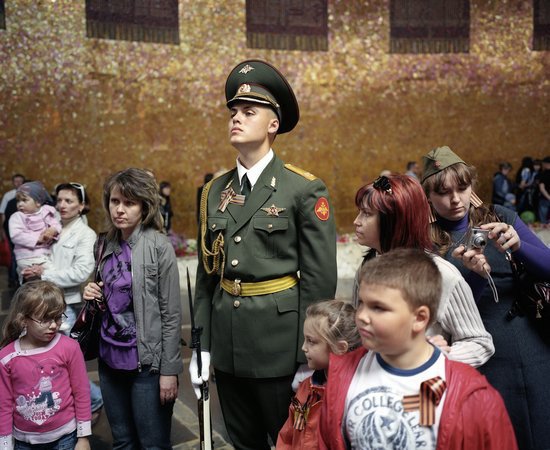Meinrad Schade
dal 5/3/2015 al 16/5/2015
Segnalato da
5/3/2015
Meinrad Schade
Fotostiftung Schweiz, Winterthur
War without War. The project reflect around conflicts through the artist's dedicated photo essays in today's Russia and in states of the former Soviet Union.

Meinrad Schade (born 1968) has been working for more than ten years already on his
long-term project “Vor, neben und nach dem Krieg – Spurensuche an der Rändern der
Konflikte”. He has travelled regions in today’s Russia and in states of the former Soviet
Union, Israel and the West Bank, engaging with former, still smouldering and even
recurring conflicts through his dedicated photo essays. The new exhibition at the
Fotostiftung Schweiz is devoted to this project.
Meinrad Schade is not a war photographer in the classical sense. He does not take photo-
graphs at the hotspots of military conflicts so as to supply the sensationalist press with images
of violence. This “market”, which is also flourishing today in the Internet, he deliberately
opposes because, on the one hand, he simply would not have the courage to pursue brutal war
photography, and on the other, because he questions the idea that images of that kind have an
enlightening effect or act as a deterrent. Schade works slowly and over longer periods of time.
He concentrates on the subsidiary scenes in areas of conflicts, the places ignored by the media
and forgotten. In 1999, for example, he did not travel directly to the war zone in Kosovo, but
instead photographed the refugees arriving in Switzerland and being put through the admission
procedure, also the victims of war and torture, who were being given medical care in Switzer-
land.
Schade began his long-term project in 2003 with another refugee story. This time it was about
people who had made it to safety from the Chechen War to Ingushetia – a deceptive safety, as
it turned out. In 2007 and 2009 he spent some time in Kiev and Volgograd (formerly Stalin-
grad), where he photographed museums, memorial sites and monuments commemorating the
Great Patriotic War, as the Second World War is called in the Soviet Union. The year after that
he visited the former nuclear weapons test site Polygon Semipalatinsk in Eastern Kazakhstan,
where more than 500 atomic weapons tests were carried out during the Cold War. The
catastrophic results can still be seen today in the bleak steppe landscape and in the many no
less bleak faces of the people directly affected by them. And in 2011 and 2012 he took
photographs in the remote Nagorno-Karabakh, a country which broke away from Azerbaijan
using armed force after the demise of the Soviet Union. The consequences here too were an
existential catastrophe for hundreds of thousands of people, not least for those who had
“freed” themselves. Today they may be living in a kind of state of their own, but it is one that is
not recognised internationally by anyone. Isolated and disputed – another war seems
inevitable. The same applies to the situation in Israel and the Palestinian territories, where
Schade has been continuing his project since 2013.
Meinrad Schade attempts to come to grips with all these crisis situations, he listens, observes,
adopts a stance and develops a perspective – which is always very personal. Incorruptible and
precise, he shows the marks of the conflicts as they have been inscribed in the landscapes,
cities and villages. He gives a face to the physically and mentally injured people and critically
views those who escaped unharmed and proudly celebrate their former victories. Schade
delineates an unsettling image of a precarious existential state, between catastrophe and
normality. He tries to fathom larger connections which are similar all over, be it in Eastern
Europe or in Israel and the Palestinian territories.
More recently Meinrad Schade has been photographing other “theaters of war” which are
frequented by a mass audience and where – either with overt commercial interests or under
the heading of historical enlightenment – wars a staged realistically: the Eurosatory weapons
trade fair in Paris and the War & Peace Show in Beltring, England. Through his photographs
Schade shows that it is money, above all, that ensures that the series of wars worldwide will
never stop. He also points out that there is in our society a deep-seated fascination with war
and violence which even his compelling images will not eliminate – something of which
Meinrad Schade is very well aware.
Image: Meinrad Schade, Wolgograd, formerly Stalingrad, Russian Federation, 9 May 2009 © Meinrad Schade
Press Contact:
Katharina Rippstein, rippstein@fotostiftung.ch
Fotostiftung Schweiz
Grüzenstrasse 45
CH-8400 Winterthur (Zürich)
Exhibitions
Daily 11 a.m. to 6 p.m., Wednesday 11 a.m. to 8 p.m.
closed on Mondays



